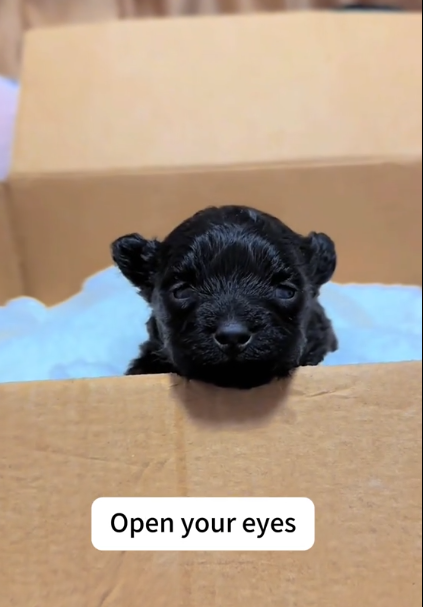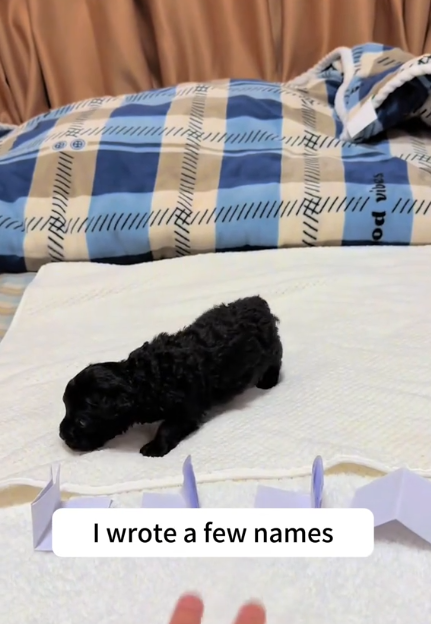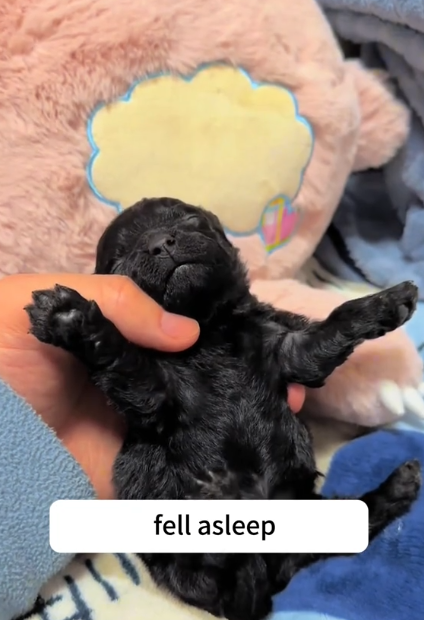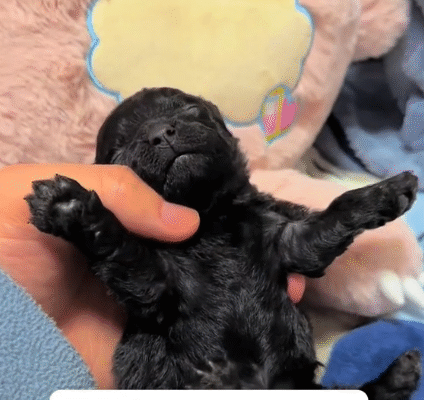
It was a humid Sunday morning when I decided to take out the garbage before the heat made the air unbearable. The alley behind my apartment was usually quiet—just the faint hum of distant traffic and the occasional rattle of a passing bicycle. I walked toward the large green trash bins, holding the bag in one hand and idly scrolling through my phone with the other.
That’s when I heard it—a faint whimper.
At first, I thought it was a cat. Stray cats often lurked around here, scavenging for scraps. But the sound wasn’t quite right—it was softer, higher-pitched, and somehow… desperate. I paused, tilted my head, and followed the noise to the bin on the far end of the row.
I set down my garbage bag and slowly lifted the lid.
Inside, among crumpled cardboard and torn plastic bags, was a small dog. Its fur was matted with dirt, and its eyes were wide with fear. The smell of rotting food surrounded it, yet the dog didn’t move—just stared at me, frozen, as if unsure whether I was a threat or a savior.
My chest tightened. “Oh no… hey, little one,” I whispered, trying not to scare it.
I glanced around. No one was there. No footsteps, no voices—just me and this tiny, trembling creature. How had it ended up here?
Carefully, I reached inside. The dog flinched but didn’t bite. It was lighter than I expected, almost weightless, and I could feel each rib through its tangled fur. My heart ached. Someone had thrown it away like garbage.
I cradled it in my arms, the smell clinging to my clothes, and stepped away from the bin. “It’s okay. You’re safe now,” I murmured. The dog shivered but made no sound.
Back inside my apartment, I set the little dog on an old towel. Under the light, I could see just how bad its condition was—fleas darted through its fur, and there was a small wound on its hind leg. Its eyes, though, were the most heartbreaking part—deep brown pools that seemed to ask, Why?
I filled a bowl with water and placed it in front of the dog. It hesitated, sniffed, and then drank so fast I worried it might choke. I had some leftover chicken in the fridge, so I shredded it into small pieces and offered it. The dog devoured it in seconds.
“You must be starving,” I said softly.

After a quick call to the local vet, I learned they could squeeze me in that afternoon. In the meantime, I ran a warm bath. The dog didn’t resist much—perhaps too weak to fight—but flinched when the water touched its skin. I worked gently, washing away layers of grime until its fur was a light brown instead of the grayish mess it had been.
When I wrapped it in a towel, it looked up at me for the first time, its eyes no longer filled with panic but with something else—cautious hope.
At the vet’s office, the doctor examined the dog thoroughly. “Female, about a year old,” he said. “Underweight, dehydrated, and she’s got a minor infection in her leg, but nothing we can’t treat. She’ll need antibiotics, proper food, and some rest.”
“Was she abandoned?” I asked.
The vet sighed. “Probably. Sadly, it’s not unusual for people to throw away pets they don’t want.”
I clenched my jaw, anger and sadness swirling inside me. “Well, she’s not going back on the street.”
The vet smiled. “Good to hear. She’s lucky you found her.”
Over the next week, my apartment transformed into a little recovery zone. The dog—whom I named Penny—slept most of the time at first, curled up on a soft blanket I’d placed in a cardboard box. Every day, she ate a little more, her eyes grew brighter, and her tail began to wag timidly when I came into the room.
One evening, as I sat on the couch reading, I felt a gentle weight settle against my leg. Penny had climbed up beside me, resting her head on my knee. I froze for a moment, then smiled, slowly stroking her clean, soft fur.
That small act—her choosing to trust me—meant more than I could put into words.
We developed routines. Morning walks became our ritual; she would sniff every tree and wag at every passing dog. At night, she’d curl up on a pillow near my bed. The quiet apartment that had once felt lonely now seemed alive with the gentle sound of her breathing.

Still, the thought haunted me—how easily her story could have ended differently. If I hadn’t taken out the trash that morning, if I hadn’t heard that tiny whimper…
Months passed, and Penny’s transformation was nothing short of miraculous. Her coat grew shiny, her eyes sparkled with mischief, and she’d zoom around the apartment with bursts of puppy energy. She had favorite toys now, a little yellow ball and a stuffed rabbit she carried everywhere.
One Saturday, I took her to the park. As she chased the ball across the grass, ears flapping and tail wagging like a banner of joy, I realized something. I hadn’t just saved Penny—she’d saved me too. Before her, my days had felt routine, predictable. Now, every morning held purpose, every evening a quiet companionship that filled a space I didn’t even know was empty.
Sometimes, people at the park would stop and comment, “She’s adorable! Where did you get her?”
And I’d smile, remembering that morning in the alley. “Found her in a trash can,” I’d say. Their eyes would widen, and Penny would sit proudly at my side, as if she knew the miracle of her own survival.
One night, as rain tapped softly against the windows, Penny lay curled beside me on the couch. I thought back to that first moment—lifting the lid, seeing her frightened eyes, and knowing in my gut I couldn’t walk away.
Life is strange like that. Sometimes you find the most precious things in the most unexpected places.
Penny wasn’t trash. She was treasure. And somehow, fate had hidden her in that bin, waiting for me to discover her.
I looked down at her sleeping form, her little chest rising and falling, and whispered, “You’re home now. Forever.”
She sighed contentedly, and I knew, deep in my heart, that we’d both been exactly where we needed to be that day—me with my garbage bag, and Penny waiting in the shadows—so our paths could cross, and two lonely souls could find each other.



